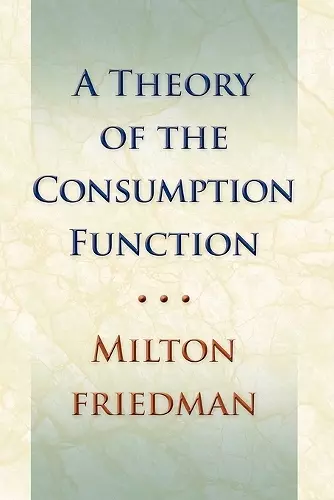Theory of the Consumption Function
Format:Paperback
Publisher:Princeton University Press
Published:15th Aug '08
Should be back in stock very soon

What is the exact nature of the consumption function? Can this term be defined so that it will be consistent with empirical evidence and a valid instrument in the hands of future economic researchers and policy makers? In this volume a distinguished American economist presents a new theory of the consumption function, tests it against extensive statistical J material and suggests some of its significant implications. Central to the new theory is its sharp distinction between two concepts of income, measured income, or that which is recorded for a particular period, and permanent income, a longer-period concept in terms of which consumers decide how much to spend and how much to save. Milton Friedman suggests that the total amount spent on consumption is on the average the same fraction of permanent income, regardless of the size of permanent income. The magnitude of the fraction depends on variables such as interest rate, degree of uncertainty relating to occupation, ratio of wealth to income, family size, and so on. The hypothesis is shown to be consistent with budget studies and time series data, and some of its far-reaching implications are explored in the final chapter.
"Friedman argued that the best way to make sense of saving and spending was not, as Keynes had done, to resort to loose psychological theorizing, but rather to think of individuals as making rational plans about how to spend their wealth over their lifetimes. This wasn't necessarily an anti-Keynesian idea--in fact, the great Keynesian economist Franco Modi-gliani simultaneously and independently made a similar case, with even more care in thinking about rational behavior, in work with Albert Ando. But it did mark a return to classical ways of thinking--and it worked. The details are a bit technical, but Friedman's 'permanent income hypothesis' and the Ando-Modigliani 'life cycle model' resolved several apparent paradoxes about the relationship between income and spending, and remain the foundations of how economists think about spending and saving to this day."--Paul Krugman, New York Times "Friedman described Keynes's theory of a declining propensity to consume as 'very imaginative and thoughtful.' But in A Theory of the Consumption Function (1957), he demonstrated that while the hypothesis seemed to make psychological sense, it was empirically false. In relating income to propensity to consume, Keynes had erred in not distinguishing between 'transitory' and 'permanent' income. In fact, consumption does not decline as incomes generally rise. Economists across the political spectrum agreed with Friedman's refutation of Keynes."--James A. Nuechterlein, Commentary
ISBN: 9780691138862
Dimensions: unknown
Weight: 369g
296 pages